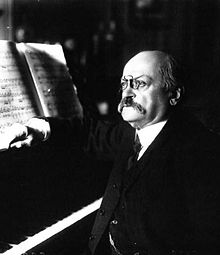Charles Lecocq
Alexandre Charles Lecocq (born June 3, 1832 in Paris ; † October 24, 1918 there ) was a French operetta composer .
Life
Lecocq was one of five children from a poor family. He was disabled and dependent on crutches since childhood. From 1849 he studied at the same time as Bizet and Saint-Saëns at the Paris Conservatory of harmony with Bazin , composition with Halévy and - despite his disability, not without success - organ with Benoist . The musical public first became aware of Lecocq when he and Bizet won first prize for the operetta Le docteur Miracle in a competition advertised by Offenbach in 1856 . This award determined his further career, as from then on Lecocq dedicated himself to the light and pleasing musical genre. His greatest success was the operetta La Fille de Madame Angot , which is still a classic of the operetta repertoire today.
In total, Lecocq wrote more than 50 operettas and over 100 songs.
Lecocq's music is rich in melodies and pleasing. It was based on the respective musical taste. It contains theatrical effects as well as pronounced lyrical roles. Lecocq himself called some of his more demanding operettas opéras comiques .
Works (selection)
- Le Docteur miracle , 1857
- La fleur du thé , 1868
- Les Cent Vierges , 1872
- La Fille de Madame Angot , Paris and London, 1873
- Giroflé-Girofla , Brussels 1874
- Les Prés Saint-Gervais , Paris and London, 1874
- La Petite Mariée , Paris, 1875
- Le Petit Duc , Paris and London 1878
- La Camargo (Libretto: Eugène Leterrier and Albert Vanloo), opéra comique 3 acts (November 20, 1878 Paris, Théâtre Renaissance)
- La Petite Mademoiselle , Paris, 1879
- Le Jour et la Nuit , Paris, 1881
- Le Coeur et la main , Paris, 1882
- La Princesse des Canaries , Paris, 1883
Web links
- Sheet music and audio files by Charles Lecocq in the International Music Score Library Project
- Literature about and recordings by Charles Lecocq in the catalog of the German National Library
- Stage works
- Stage works on www.operone.de
- Charles Lecocq - page about the composer and the German premiere of his operetta DAS TESTAMENT DES HERRN VON CRAC
| personal data | |
|---|---|
| SURNAME | Lecocq, Charles |
| ALTERNATIVE NAMES | Lecocq, Alexandre Charles (full name) |
| BRIEF DESCRIPTION | French operetta composer |
| DATE OF BIRTH | June 3, 1832 |
| PLACE OF BIRTH | Paris |
| DATE OF DEATH | October 24, 1918 |
| Place of death | Paris |
